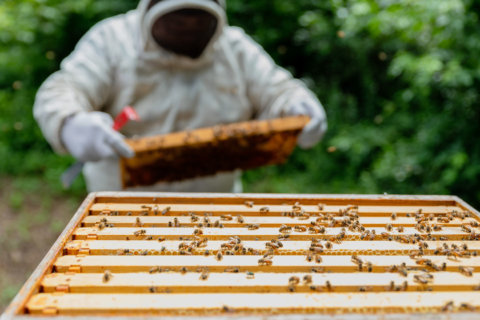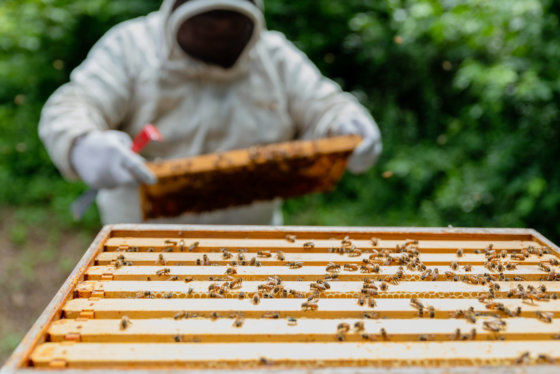Thousands of bees, swarming on a car in a parking lot in the Merrifield section of Fairfax County, Virginia, certainly looked scary — so, a woman called a nearby fire station.
Thankfully, fire Capt. David Weand was on duty Tuesday at Station 23, in Annandale.
“Normally, bees aren’t our thing, but she called because she was concerned that it might have been a danger to anybody walking by,” Weand told WTOP.
Weand and fellow firefighters and paramedics found the white car, with thousands of bees swarming behind the rear wheel on the driver’s side.
“The normal response from firefighters probably would have been just to show up and hose them down, just to get them to disperse,” Weand said. “In fact, as we were driving down and I was explaining to the crew what we were going to check out, they asked, ‘Are we just gonna hose them down?’ — I said no, not at all. We want to save the bees.”
When the crew arrived, Weand learned the building manager had already contacted someone to safely collect the bees.
As a hobbyist beekeeper, Weand knew every spring, half of a honeybee colony splits off to form a new swarm and find a new home. So, he wasn’t concerned about getting stung.
“I knew it was safe — there wasn’t a health risk, so we didn’t have to secure the area,” Weand said. “Most of the people who come to collect them don’t even have to wear any protective equipment — they’re just using bare hands, scooping them into a bucket.”
Though Weand and fellow firefighters were happy to help in this instance, if homeowners encounter a swarm on their property, he suggests Googling a local bee group to find a beekeeper who will safely remove and transport the bees.
“They beekeepers love it, because it’s free bees — they get to add a new colony to their bee yard for free, without having to go buy them,” Weand said. “Typically, that would cost $150 to buy them from some breeder.”
Since 2006, bee colony collapse disorder has caused adult honeybees to simply disappear from hives, almost all at the same time.
“Right now, with honeybees difficult to keep alive, and how important they are to flowers, the ecosystem — and everybody’s home garden — it’s important to try to help them out whenever we see them in this situation, and make sure they get into a new home,” Weand said.
Editor’s note: A previous version of this story stated that the woman called 911. It has been updated to reflect that she called a nearby fire station.








